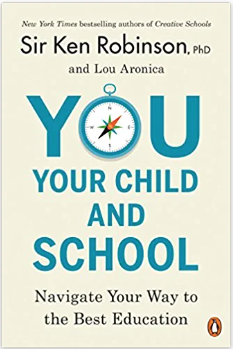You, Your Child, and School: Navigate Your Way to the Best Education
Author: Sir Ken Robinson & Lou Aronica.
What is the book about as a whole?
The book encourages parents who want the best education for their children to actively make decisions to help their children get the best education possible.
What is being said in detail, and how?
The book starts with the characteristics of a child’s development and how that should translate into elements of education. Then the book went into detail on different types of education systems and how the parents can participate and advocate for their children.
Is the book true, in whole or in part?
The book contained research on child development as well as research on school’s impact on children’s development and learning.
Why does the author think it is important to know these things?
The author believes that the parents are ultimately responsible for their children’s education, and the school is just a partner in that journey. Parents should know what is good education and how to advocate for their children to get it without overstepping boundaries.
Impressions
This book was insightful and came from the perspectives of what is best for children. Understanding different types of intelligence and helping children find and foster their passion through education.
Who Should Read It?
Every parent should read it. It includes education systems such as homeschooling, charter, private, and public. Administrators should also read it to think about partnering with parents to provide the best education for the students.
How the Book changed me (thoughts, ideas, behavior)
It reinforces the understanding that the school is a partner to the parents, not the only place where a child is educated. Therefore, the school administrator should spend more time thinking about partnering with parents.
My Top 3 Quotes
A school is any community of people who come together to learn with and from each other.
Intelligence has three main components: analytical, the ability to make judgments and comparisons between things; creative, the ability to come up with new ideas or deal with unfamiliar situations; and practical, the ability to work within your environment and manage the world around you.
Democratic societies depend on people being active citizens who are aware of their rights and responsibilities, informed about how social and political systems work, concerned about the welfare of others, articulate in their opinions and arguments, and responsible for their own actions.
Get the Book: Apple Books / Amazon / Amazon Kindle
